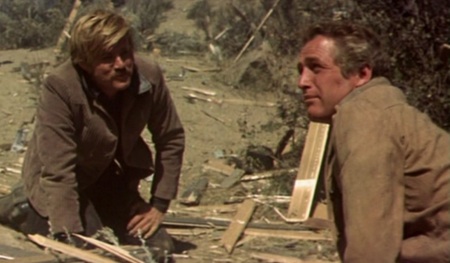 |
| Think ya used enough dynamite there, Butch? |
The playful duo pull a couple of bank robberies and then danger comes, the kind of danger that says flee instead of stand and fight--a super posse. An angry railroad baron calls for their heads and assembles an unrivaled gang of lawmen and trackers to make sure they don't get away. Every time Butch and Sundance think they're free, the posse shows up, foiling any feelings of relief.
 |
| Who are those guys? |
At the end of the day, Goldman's masterful screenplay is all about dialogue and every writer's friend, the monomyth. The dialogue, on top of completing it's primary purpose of moving the story forward, is simply dripping with wit. There are seemingly more moments that illicit laughter than there are moments of intense drama. In short, it's fun, it's got action, and it's got drama, and that's rare for a screenplay. Also, by virtue of being a Western, the Hero's journey or monomyth is on full display. Yes, every story contains the monomyth in some fashion, but here it is more prevalent. All the boxes are checked very clearly. Does that make it formulaic and unoriginal?
Not in the slightest.
No comments:
Post a Comment